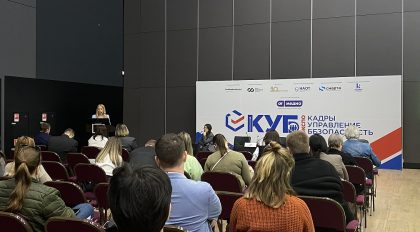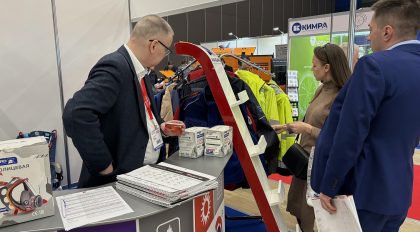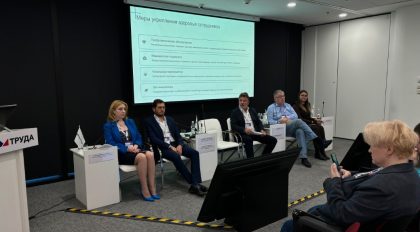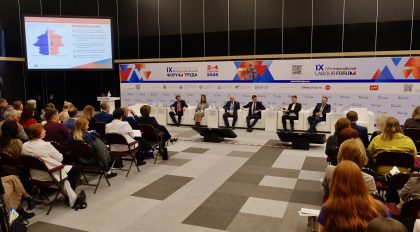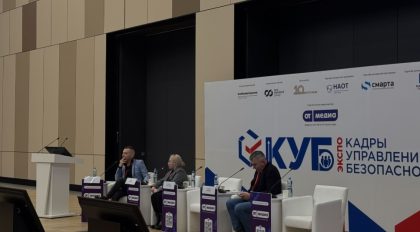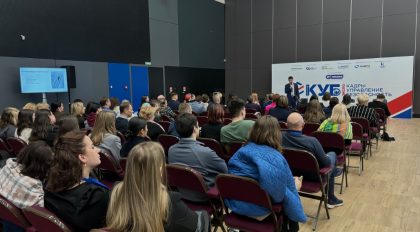The current demand for workers in Russia in 2024 is 45% higher than in the previous year, Headhunter representatives announced at the opening of the IX St. Petersburg International Labor Forum, held at Expoforum. While some companies are looking for ways to train and attract blue-collar workers, others are thinking about how to keep and retain them. Designer workwear, safety shoes, and relaxation rooms are being developed for employees. New developments and solutions designed to improve working conditions in production and attract young people are presented at the CUBE EXPO 2025 exhibition.
An important role is given to educational events. Among the exhibitors are the Committee on Labor and Employment of the Population of St. Petersburg and the educational project of St. Petersburg State University «Advanced Engineering School». The purpose of the university unit is to train engineering personnel for the mineral resources industry.
Artem Kudinov, head of the Scientific and Technical Department of the Advanced Engineering School of St. Petersburg State University, sees the value of the project in the fact that, thanks to the university’s close cooperation with leading industry enterprises, students find future employers during their studies. The Committee on Labor and Employment of the Population of St. Petersburg clarified that if targeted training involves one hundred percent employment, then a project such as an Advanced Engineering School, although it does not guarantee, but greatly increases the graduate’s employability.
Elena Gorina, Director of the training center of ECT LLC (United Labor Center Group of Companies specializes in providing labor protection services), told the participants and guests of the exhibition about the specifics of protecting workers’ working conditions.
«Our most disciplined students are not doctors or engineers, as one might assume, but builders. St. Petersburg is actively being built, and the majority of those who follow legislative and technical changes are industries where occupational injuries are highly developed,» the expert said.
In addition, the construction industry is closely linked to attracting migrants, for whom the employer has to bear enormous responsibility. And, of course, this is an industry that is constantly under the supervision of regulatory authorities.
«Medical examinations, language training, production technologies, regular monitoring — and as a result, migrants are often more prepared in occupational safety issues than our builders,» Elena Gorina summed up.
The issue of occupational safety is acute in complex industries, so Russian industrialists have begun to actively pick up trends and adapt to the market. Thus, the Komus company saw the creation of its own brands of personal protective equipment as one of the promising areas of activity to replace the departed foreign ones.
Madina Ruslanova, a representative of Komus LLC, considers the development of a customer-based business to be the key to success: «When global manufacturers of PPE (personal protective equipment) began to leave the market, we started thinking about how we could close this need for our partners, developed our own Topfort trademark and now manufacture high-tech hand protection products from scratch (various types of gloves), respiratory organs (respirators), feet (shoes for builders with metal insole, special shoes for oil and gas workers, food workers)».
Soon, a line of specialized clothing was added to the PPE line. Everything is made in Russia. «We are helping our partners to develop and we are developing ourselves due to this,» Madina Ruslanova does not hide her pride.
Other manufacturers, in particular, Avangard Workwear Northwest LLC, a developer and manufacturer of professional equipment, followed the same path — compensating for the departure of foreign players. The company’s specialty is beautiful, functional and comfortable clothes and shoes for workers. The manufacturer has no doubt: workwear ceases to be a utilitarian item with a complete lack of design. A worker at the end of the day should not rush to get rid of work clothes, because they are uncomfortable and unattractive in appearance. It is necessary to blur the line between overalls and casual clothes. This is a global trend, and we want to match it. Designer shirts made of special (fire- and wear-resistant) denim also have protective and signaling functions, but they are absolutely appropriate in an ordinary urban environment, that is, outside the workplace.
«When the head of an enterprise treats a worker not as a tool that pulls or drills something, but evaluates him as an investment and cares about his comfort and appearance, then people want to work for such a leader,» Igor Kiriyenko, director of AW Northwest LLC, has no doubt.
Nicole Laboratory, a manufacturer of cosmetic products, has made a bet on caring for the health of the working atmosphere (both physically and psychologically). Svetlana Gutseva, the manager of work with leading clients, spoke about the innovative development presented at the exhibition — phyto-sprays and phyto-concentrates. Many enterprises make relaxation and relaxation rooms for their employees, and Nicole Laboratory equips them with phyto-installations, which, thanks to the complex action of sprayed essential oils, increase efficiency, reduce stress levels and enhance employee immunity.
«Our research has shown that as a result of using such installations, the incidence in teams decreases by 20–30%. The positive effect is also expressed in the fact that the staff feels care for them and the company’s contribution to the health and well-being of each employee. Thus, the overall emotional background at the enterprise also increases,» Svetlana Gutseva summed up.
The CUBE EXPO 2025 exhibition presents developments that will improve the field of work for staff, but the staff themselves sometimes have to make room: robots and automated systems are increasingly replacing people.
Anton Dubynin, Head of Major Businesses at Nobilis LLC, demonstrated to the guests of the exhibition industrial, mobile and vandal-proof complexes that allow for remote pre-trip and pre-shift medical monitoring. The automated complex, with the size of an average mailbox, is fully equipped with all medical meters (tonometer, thermometer, breathalyzer) and replaces the paramedic station at the enterprise, as well as eliminates the need to maintain medical staff. It also significantly speeds up the diagnostic process: the speed of self-examination of one person at an industrial complex is less than 1 minute, while a paramedic spends about 10 minutes on it. If we consider that the device costs an average of 180–230 thousand rubles, the warranty period is 5 years, and annual verification and consumables are included in the cost of the complex, then the benefits for the enterprise are obvious. Russian Railways, Gazprom, and Rosavtodor are among Nobilis’ largest clients.
But not always leading enterprises can feel the advantages of domestic developments. Daniil Rutkovsky, Development Manager at Stels Neva, complained that major Russian companies were advising their regional divisions to use modern slip protection manufactured by Stels Neva, but sales had not yet taken off.
«We are the only Russian manufacturers of patented and certified anti-slip materials that comply with all international and, of course, Russian standards. But we stumbled over cheap rubber mats. They are the main competitors of our high-tech products. In this situation, price and habit run the show. We will try to reverse this situation,» Daniil Rutkovsky expressed hope.
